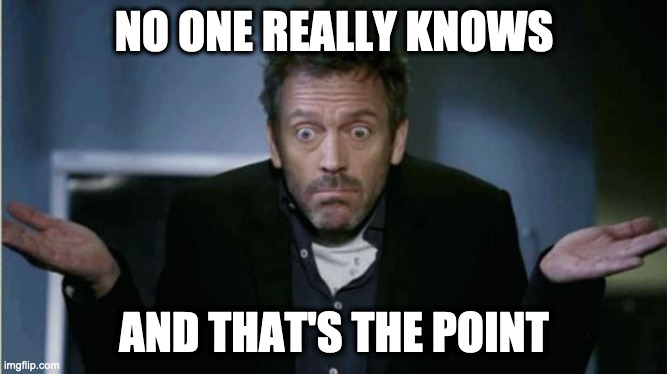If we're going to be talking about a game, it makes sense to define what it is, right? Well, yes and no. You see, Dungeons and Dragon's isn't really a game. You read that correctly. Despite the 'G' in 'TTRPG', this table top role playing game is not quite a game; more specifically, it's not a complete game. Let me explain.
Picture any other popular table board games; Monopoly, or Risk, or Settlers of Catan. Those are complete games. They have everything you need to run them contained in one box: a simple rule book, a limited number of legal actions with clear outcomes for each one, a play space/board, pieces to represent the players and/or their assets, and a clearly defined goal. These games don't work without all of these components. At first glance, a lot of this would seem to apply to D&D too -- you have a book that has (albeit not always simple) rules, some of those rules cover actions and outcomes, there can be maps and miniatures, and most people can agree leveling up their characters is a universal goal. There's even a shiny starter set Wizards of the Coast puts out with miniatures and dice and a board/map, just like these other games!
Only it isn't like that at all. You don't actually need a board or pieces to play this "game" we call D&D. In fact there is an entire sub-group of the hobby where grids and maps are dispensed with in favor of a "Theater of the Mind" approach. Some DMs never bring a map to session, others spend thousands of dollars and hundreds of hours collecting and painting a massive array of miniatures and terrain pieces and battlemats, while others are content to use a white board and markers or a bare table and bottle caps to track positioning. It is all up to the DM and Players' preferences.
You also don't really have all that clear a goal in D&D, either. Sure, leveling up a character exists as an overarching goal for most players, but there are an infinite number of ways to go about doing that. Some players (self included) aren't even as interested in gaining experience points as we are in exploring the world and reveling in the stories that can be told through game-play. It isn't even possible to settle definitively what level progression looks like, as the game can be designed to use experience points, but milestone leveling also exists... or even, if so desired, there might be no level progression at all across an entire campaign. It is all up to what the DM and Players agree to.
But surely, the rule book is what makes D&D into a proper game, right? It's what turns an unrestricted game of make-believe into a proper, respectable hobby. Rules make things predictable, and repeatable, and inject random chance into outcomes in a fair and balanced way. The rules place all kinds of limitations on the game actions through move speeds, attack bonuses, armor classes, and hit points... right?
Wrong. To an extent. You see, the best kept secret of D&D is that there are no rules. More accurately, the rules don't apply until the DM decides they do. Even Gary Gygax, the creator of D&D himself, said in a (probably apocryphal) quote:
"The secret we should never let the game masters know is that they don't need any rules."
Well, I've pulled the curtain back, the cat's out of the bag, the jig is up, the secret's out... You don't need any expensive gear or pricey books to play D&D. You don't a 30-sided die or 1000 meticulously painted goblin minis... but that's not to say that there aren't tools to make playing easier. All you need to have in order to play D&D is at least one player and at least one DM; after that, it's just gravy. DMs pick which tools they think add to their game, and ignore the tools that detract, and then sell that to their Players.
You noticed something recurring in the last few paragraphs, didn't you? Well, that was by design. The DM and the Players have a lot of say in what D&D looks like for their group, more than any book, or any monster stat, or any game designer. Why? Because they ARE the game designers. And the CPU. And the Graphics card. And the Writers. And a million other roles.
D&D is not a game. It is a game engine. It gives a loose framework that can be used to develop the stories and sessions the DM and Players want to have. It can be infinitely customized, infinitely tweaked, and have entire chunks sewn in or gutted out of it and still work fine.
In the next installment, I'll go over the core game-play loop and how easy it actually is to be ready to run the game at a basic level.

No comments:
Post a Comment